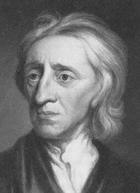
John Locke was born in Wrington (near Bristol), England, on 29 August 1632 he was educated at Westminster School and Christ Church, Oxford. In 1658 he became tutor and professor of Greek and Rhetoric. He returned to Oxford and studied medicine.
Locke's fame was greater as a philosopher than as teacher. Virtually all subsequent thinking was influenced by his empiricism, before emptying into the skepticism of Hume. In pedagogy, Locke did not intend to create an education system, but to explain the guidelines of education for the children of the nobility, thus their ideas represent both a reflection of the pedagogical perception of time as a profound reflection on their merits, defects and scope.
He influenced decisively in the ideas of the Glorious Revolution and the Bill of Rights 1689 British.
After some ups and downs in the world of international politics, which earned him many problems, Locke turned the experience of his intellectual life in two summit works: An Essay Concerning Human Understanding (1690) and Thoughts on Education (1692).




